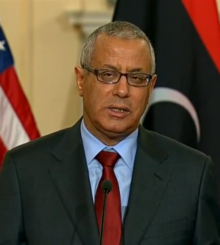Ali Zeidan
| Ali Zeidan علي زيدان |
|
|---|---|
 |
|
| Prime Minister of Libya | |
|
In office 14 November 2012 – 11 March 2014 |
|
| President |
Mohammed Magariaf Juma Ahmad Atigha (Acting) Nouri Abusahmain |
| Preceded by | Abdurrahim El-Keib |
| Succeeded by | Abdullah al-Thani |
| Personal details | |
| Born | 1950 (age 66–67) Waddan, Fezzan-Ghadamès (now Libya) |
| Citizenship |
Libya Germany |
| Political party | National Party For Development and Welfare |
| Alma mater | Jawaharlal Nehru University |
| Religion | Sunni Islam |
Ali Zeidan (sometimes written as Zidan; Arabic: علي زيدان; born 1950) is a former Prime Minister of Libya. He was appointed by the General National Congress on 14 October 2012, and took office on 14 November after Congress approved his cabinet nominees. Prior to the Libyan Civil War, Zeidan was a Geneva-based human rights lawyer and according to the BBC, is considered by some local observers as a strong-minded liberal. He was ousted by the parliament committee and fled from Libya on 14 March 2014. However, he told the press conference in Rabat, Morocco, that the ousting was invalid.
Ali Zeidan served as a diplomat for Libya during the 1970s, serving in India under Ambassador Mohammed Magariaf. Both men defected in 1980 and went on to form the National Front for the Salvation of Libya. Zeidan spent nearly three decades in exile in Geneva after the defection.
During the revolution Zeidan served as the National Transitional Council's Europe envoy, and is credited as having played a key role in persuading French President Nicolas Sarkozy to support the anti-Gaddafi forces.
On 7 July 2012, Zeidan was elected as an independent congressman for Jufra in the 2012 Congressional election. He ran for the position of Speaker of the Congress, but ultimately lost out to his former opposition colleague Mohammed Magariaf, obtaining 85 votes. On 10 October 2012, Zeidan resigned his seat in Congress.
Following Mustafa Abushagur's unsuccessful attempt to form a government, Zeidan resigned his seat in Congress and ran for the position of Prime Minister against the Justice and Construction Party's favoured candidate, Mohammed Al-Harari. Zeidan was elected Prime Minister-designate by a vote of 93 to 85, with two weeks to submit his proposed new government for approval by Congress. Zeidan was reported to have been supported by members of Congress belonging to the generally liberal National Forces Alliance (organized by Mahmoud Jibril), as well as by certain independents informally affiliated as the Workers group (with 20 members) and the Southern group (with 31).
...
Wikipedia
